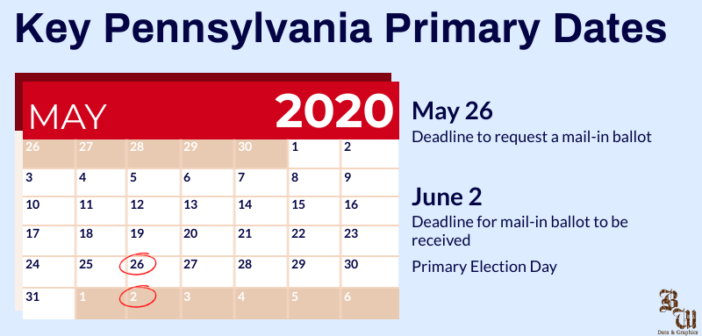Pennsylvania will hold its primary election on June 2.
The primary, originally scheduled for April 28, was postponed in response to the COVID-19 pandemic. Pennsylvania Gov. Tom Wolf made additional electoral changes, allowing counties to count mail in ballots starting at 7 a.m. on June 2 — rather than when polls close at 8 p.m. — and to consolidate polling places to ease burdens on poll staffing.
Pennsylvania is not alone in changing its election process, with 15 other states and two territories either postponing their election date or opting to conduct the election by mail-in ballots.
Over 1.6 million mail-in ballot requests have been filed with Pennsylvania’s county election offices as of May 21, according to the Pittsburgh Post-Gazette.
Many counties have already received more mail-in ballot requests than in the 2016 general election. Northampton County has processed 35,685 mail-in ballots as of May 18.
With such an increase in mail-in ballots in the primary, it is plausible Pennsylvania’s election results will not be reported on Election Day.
“Democracy is worth it,” said Brian Fife, professor and chair of the political science department. “If we have to wait a few hours or even a few days, we will be OK.”
Limited access to in-person polling places as a result of COVID-19 and essentially guaranteed presidential nominees brings serious concerns about voter turnout. Malini Ray, ‘19G, a field organizer for NextGen Pennsylvania, said it is a common misconception that voting in primary elections isn’t important. NextGen is a progressive nonprofit focused on increasing voter turnout among young adults.
College students and young people are notoriously disengaged in the electoral process, and the increased barriers that accompany voting from home due to coronavirus and by mail may reduce turnout, Fife said.
Even with access to mail-in ballots, Pennsylvania voters will be able to opt to vote in-person on June 2.
“I don’t know what we’re going to see at polling places on June 2, and I don’t know what I hope to see,” said Devin Yeatter, ‘21, who serves as the executive director of PA Students for Biden. “Voting in this primary will be a powerful way to show democracy’s resilience in times of crisis and, after the election, voters will know that their voices were heard, and they can still have faith that the system marches on even through something like this.”
The primary will serve as a trial run for how voting may play out in the November general election. For voters to protect themselves against the health risks associated with voting in-person, every state must develop mail-in ballot contingency plans, Fife said.
“Democracy is worth it. If we have to wait a few hours or even a few days, we will be OK.”
-Brian Fife, professor and chair of political science
Ray agreed, saying that “ideally, we will see more expansive mail-in voting laws and procedures” before November.
How can I request a mail-in ballot?
To vote by mail-in ballot, there are two options: voters with Pennsylvania IDs are able to file a request online with their county election office, and voters without Pennsylvania IDs must mail in a request for the ballot.
What are the dates I should know for voting by mail?
The deadline to request a mail-in ballot for the June 2 election is May 26. All mail-in ballot requests must be received by 5 p.m. by a voter’s respective county election office. The completed mail-in ballots must be received by 8 p.m. on June 2.
Lehigh is located in Northampton County. Students registered to vote at their off-campus Bethlehem address should go through the Northampton County election office to find their polling location for those who wish to vote in person.
Who can vote in this primary?
You must be registered to vote in Pennsylvania to vote in the June 2 primary.
In Pennsylvania, primaries are closed — meaning a voter is only allowed to receive a ballot for the party for which they are registered. A registered Democrat may only vote on the Democratic ballot, and a registered Republican may only vote on the Republican ballot.
Individuals not registered with a political party can’t vote in the Pennsylvania primary, but will be eligible to vote in November.
Voters can consult the Pennsylvania Official Voter Information website for more information on requesting mail-in and absentee ballots, polling locations and operating hours, and registration questions.
“If anyone is ever wary about the status of their ballot and they’re unable to track it for some reason, it’s always safe to just call the county elections office where you’re voting just to either follow up or ask any questions that you have,” Ray said.
Who’s on the ballot?
The June 2 primary will include candidates running for president, state representative, attorney general, Congress and delegate to the Republican and Democratic National Conventions, among others.
President of the United States
Donald Trump (R) – President Donald Trump, the incumbent and presumptive Republican Party nominee, has championed a record of tax breaks, cutting regulations and promoting an ideology of “America First.” Trump won Pennsylvania by less than a percentage point in 2016, and the Keystone State promises to be crucial to his 2020 re-election hopes.
Joe Biden (D) – Former Vice President Joe Biden is the presumptive Democratic Party nominee. As a U.S. senator from Delaware, he spearheaded the Violence Against Women Act and Brady Background Check Bill. Biden hopes to add a public option to the Affordable Care Act, make America a net-zero emission and 100 percent clean energy economy by 2050, and reduce barriers for workers who want to unionize.
Other Democratic candidates like Sen. Bernie Sanders and Rep. Tulsi Gabbard qualified to appear on the Democratic sample primary ballot, but both announced they have dropped out of the race.
Pennsylvania’s 7th Congressional District
Susan Wild (D) – Rep. Susan Wild, the incumbent, is facing her first re-election bid after winning her House seat following the 2018 Pennsylvania redistricting and midterm elections. Wild sits on the House Committee on Ethics and the House Committee on Education and Labor.
Dean Browning (R) – A Kentucky native, Browning settled in the Lehigh Valley in 1979. Browning previously served as a Lehigh County Commissioner and is a self-described pro-life and pro-2nd amendment Christian conservative.
Lisa Scheller (R) – Coming off a recent endorsement from Trump, Scheller currently serves as CEO and president of Silberline Manufacturing, a company that produces paint pigments. A former Lehigh County Commissioner and two-year chair of the board, Scheller believes in lower taxes, increased government transparency and spending restraint.
Pennsylvania attorney general
Josh Shapiro (D) – Josh Shapiro, elected in 2017, previously served as a Pennsylvania state representative and as chairman of the Montgomery County Commissioners. As attorney general, Shapiro has focused on curbing the opioid epidemic, protecting women’s access to free contraception under the ACA, and exposing child sexual abuse within the Pennsylvania Catholic Church.
Heather Heidelbaugh (R) – Born in Missouri, Heidelbaugh came to Pennsylvania in 1988. She has served on the Governor’s Commission on Judicial Appointments and as an Allegheny city councilwoman. She also regularly appears as a GOP radio and television political analyst.
135th Pennsylvania State House District
Steve Samuelson (D) – State Rep. Steve Samuelson has represented the 135th district in Harrisburg since 1999. The district covers Bethlehem. He currently serves as the Democratic Chair of the Aging and Older Adult Services Committee. He is also a member of the LGBTQ Equality Caucus, the Mental Health Caucus, and the Climate Caucus.
Scott Hough (R) – A private security professional and former Pennsylvania State Constable from 1998 to 2013, Hough hopes to be a community-minded voice for the 135th district. He wants to encourage small business and entrepreneurship, curb the opioid epidemic, and update infrastructure in the region.
Pennsylvania state treasurer
Joe Torsella (D) – The incumbent, Torsella previously served as U.S. Representative to the United Nations for Management and Reform. He is committed to fiscal responsibility, improving the conditions for low and middle income Pennsylvanians and bringing innovative solutions to public service.
Stacy Garrity (R) – A former U.S. Army Reservist and two-time Bronze Star recipient, Col. Garrity hopes to eliminate hidden fees and wasteful spending, open the Pennsylvania books to increase transparency for taxpayers and make it easier for families to open and maintain 529 accounts to offset the rising cost of college.
There are additional candidates running for Pennsylvania Auditor General, and each party has candidates on the ballot as delegates to their respective party’s conventions.






Comment policy
Comments posted to The Brown and White website are reviewed by a moderator before being approved. Incendiary speech or harassing language, including comments targeted at individuals, may be deemed unacceptable and not published. Spam and other soliciting will also be declined.
The Brown and White also reserves the right to not publish entirely anonymous comments.
1 Comment
I live in a state with open primaries which seems to give better opportunities for getting the representation that you would want.. PA has historically been a hotbed of partisan politics. At least through the seventies you could save time by voting for all Republicans (R) or Democrats (D)in the general election. If you are stuck in a gerrymandered district, the current primary system give no possibility of relief. The party pick be it R or D is going to be your representative like it or not. Lets say you are a middle of the road R and you are not pleased with President Trump and also several of the D presidential candidates are still in the race, in an open primary you could vote for a candidate closer to the center. This works best if your party has no chance of winning and there is one or a limited number of candidates running against a flawed incumbent.
“Cynthia Ann McKinney (born March 17, 1955) is an American politician and activist who is an assistant professor at North South University, Bangladesh.[1] As a member of the Democratic Party, she served six terms in the United States House of Representatives. She was the first black woman elected to represent Georgia in the House.[2] She left the Democratic Party and ran in 2008 as the presidential candidate of the Green Party of the United States.
In the 1992 election, McKinney was elected in Georgia’s newly re-created 11th District,[3] and was re-elected in 1994. When her district was redrawn and renumbered due to the Supreme Court of the United States ruling in Miller v. Johnson,[2][4][5] McKinney was elected from the new 4th District in the 1996 election. She was re-elected twice more without substantive opposition. McKinney was defeated by Denise Majette in the 2002 Democratic primary. Her defeat was attributed to some Republican crossover voting in Georgia’s open primary election, which permits anyone from any party to vote in any party primary and “usually rewards moderate candidates and penalizes those outside the mainstream.”[6]